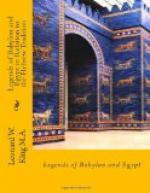The cumulative effect of such general and detailed evidence is overwhelming, and we may dismiss all doubts as to the validity of Dr. Poebel’s claim. We have indeed recovered a very early, and in some of its features a very primitive, form of the Deluge narrative which till now has reached us only in Semitic and Greek renderings; and the stream of tradition has been tapped at a point far above any at which we have hitherto approached it. What evidence, we may ask, does this early Sumerian Version offer with regard to the origin and literary history of the Hebrew Versions?
The general dependence of the biblical Versions upon the Babylonian legend as a whole has long been recognized, and needs no further demonstration; and it has already been observed that the parallelisms with the version in the Gilgamesh Epic are on the whole more detailed and striking in the earlier than in the later Hebrew Version.(1) In the course of our analysis of the Sumerian text its more striking points of agreement or divergence, in relation to the Hebrew Versions, were noted under the different sections of its narrative. It was also obvious that, in many features in which the Hebrew Versions differ from the Gilgamesh Epic, the latter finds Sumerian support. These facts confirm the conclusion, which we should naturally base on grounds of historical probability, that while the Semitic-Babylonian Versions were derived from Sumer, the Hebrew accounts were equally clearly derived from Babylon. But there are one or two pieces of evidence which are apparently at variance with this conclusion, and these call for some explanation.
(1) For details see
especially Skinner, Genesis, pp. 177
ff.
Not too much significance should be attached to the apparent omission of the episode of the birds from the Sumerian narrative, in which it would agree with the later as against the earlier Hebrew Version; for, apart from its epitomized character, there is so much missing from the text that the absence of this episode cannot be regarded as established with certainty. And in any case it could be balanced by the Sumerian order of Creation of men before animals, which agrees with the earlier Hebrew Version against the later. But there is one very striking point in which our new Sumerian text agrees with both the Hebrew Versions as against the Gilgamesh Epic and Berossus; and that is in the character of Ziusudu, which presents so close a parallel to the piety of Noah. As we have already seen, the latter is due to no Hebrew idealization of the story, but represents a genuine strand of the original tradition, which is completely absent from the Babylonian Versions. But the Babylonian Versions are the media through which it has generally been assumed that the tradition of the Deluge reached the Hebrews. What explanation have we of this fact?




